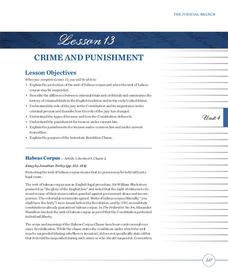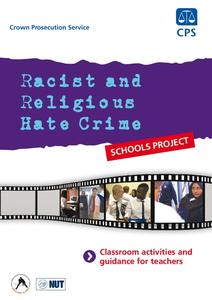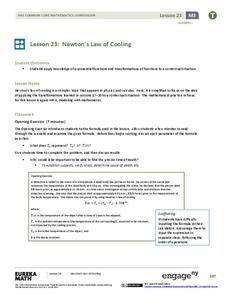Heritage Foundation
Crime and Punishment
You wouldn't give someone a 10-day timeout for eating a piece of candy. The US government, too, does not believe in unreasonable punishment. A variety of exercises exploring the clauses of the US Constitution prompts class members to...
Radford University
The Pythagorean Theorem in Crime Scene Investigation
It's a Pythagorean who-dun-it. Pupils apply the Pythagorean Theorem in several different real-world scenarios involving right triangles. By solving each task, they find the thief who was responsible for a museum heist.
Curated OER
Evaluating Crimes
What is crime? Discriminate between criminal and non-criminal behavior with your scholars by engaging them in potentially heated discussion about various scenarios. A brief definition of the word crime precedes individual analysis of 15...
Crown Prosecution Service
Racist and Religious Hate Crime
Address the current political climate with a series of thought-provoking activities. A resource packet provides pupils with strategies for challenging racist behavior and religious prejudice, and moves them from being passive bystanders...
BBC
Crime
Crime and punishment! Learners discuss the law, civics, and crime in the UK. They brainstorm lists of crimes and possible punishments, complete activities on a website, role-play a Juvenile Court scenario, and try to think of ways they...
US Institute of Peace
Simulation on The Cambodia Peace Settlement
Can there be peace in Cambodia? Immerse your class in a realistic negotiation setting during a riveting simulation. Learners assume the roles of key players in a group sparring with an opposing group to try to achieve peace in the midst...
EngageNY
Newton’s Law of Cooling
As part of an investigation of transformations of exponential functions, class members use Newton's Law of Cooling as an exponential model to determine temperature based on varying aspects. The resource makes comparisons between models...
Other popular searches
- Homicide Crime Scenarios
- Robbery Crime Scenarios
- Crime Scenarios Fingerprint
- Hate Crime Scenarios
- Factual Crime Scenarios
- Rape Crime Scenarios
- Crime Scenarios on Science
- Crime Scenarios With Guns
- Homoicide Crime Scenarios
- Crime Scenarios Shooting
- Computer Crime Scenarios








